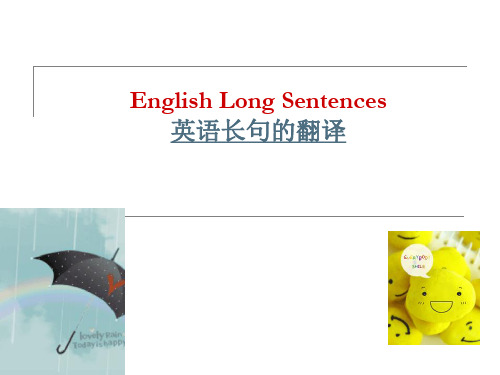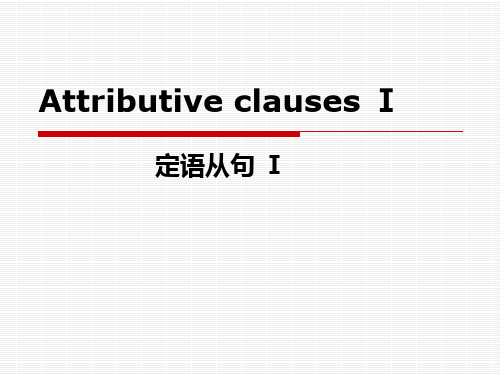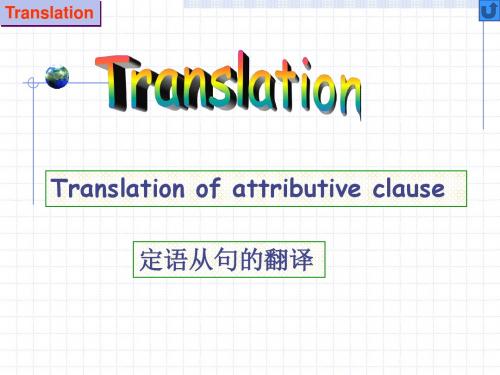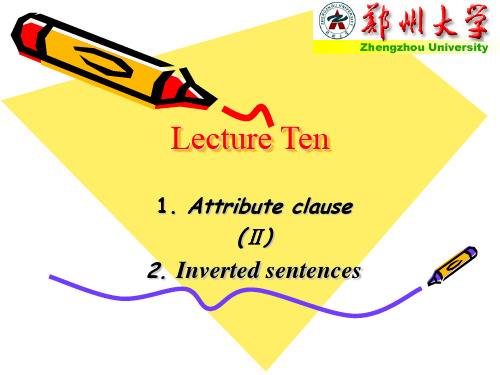英汉互译10-attributive clauses
- 格式:doc
- 大小:91.50 KB
- 文档页数:5






Unit 10 Attributive ClausesOf various English subordinate clauses, the attributive clause is perhaps the most complicated and therefore it always poses a hard nut for the translator to crack. This is either because of the disparity between English and Chinese syntax or because of their habitual modes of expressing the same idea in different ways. And here are some instances from the above Practical Translation Training:▪The saga of the White Star Liner Titanic, which struck an iceberg and sank on its maiden voyage in 1912…▪白星公司班轮泰坦尼克号在1912年的处女航中因撞上冰山而沉没的传闻轶事……▪… the railings where doomed passengers and crew members stood…▪那些惨遭厄运的乘客和船员曾站过的栏杆旁……▪…Marine Geologist Robert Ballard, 44, who led the teams from the Woods Hole Oceanographic Institution that found the Titanic last September…▪……44岁的海洋地质学家罗伯特﹒巴拉德领导德伍兹霍尔海洋研究所科学探险队,该队于去年9月发现了泰坦尼克号……▪… the 300-ft. gash that, according to legend, was torn in the Titanic’s hull▪……传说中泰坦尼克船体上那条划破长达300英尺的裂缝▪…the stern, which settled on the bottom almost 1,800 ft. from the bow, had swiveled 180 on its way down.▪……船尾在下沉时旋转了180度,在海底距船首几乎有1800英尺远。
I.A Comparative Study of English and Chinese Attributive StructuresAs some linguists have pointed out, an English sentence may be followed by an unlimited number of attributive clauses behind the word being modified, while a Chinese sentence allows only a limited amount of words preceding the word being modified. And eventually, there is no correspondence between their sentence structures. A comparative study of English and Chinese attributive structures helps us to bring this disparity to light.1.This is the cat. 这就使那只猫。
2.This is the cat that killed the rat. 这就使那只捕杀了老鼠的猫。
3.This is the cat that killed the rat that ate the cake. ﹡这就是那只捕杀了偷吃了蛋糕的老鼠的猫。
4.This is the cat that killed the rat that ate the cake that was put in the house. ﹡这就是那只捕杀了偷吃了放在房间里的蛋糕的老鼠的猫。
5.This is the cat that killed the rat that ate the cake that was put in the house that Jack built. 这﹡就是那只捕杀了偷吃了放在杰克修建的房间里的蛋糕的老鼠的猫。
Apparently, it’s impossible for a translator to put all the information into one Chinese sentence in the same sequence as in English. Thus, a readable Chinese version of the above English sentence 3, 4, 5 should be respectively like this:3. 这就是那只捕杀了老鼠的猫。
老鼠偷吃了蛋糕。
4.这就是那只捕杀了老鼠的猫。
老鼠偷吃了放在屋里的蛋糕。
5.这就是那只捕杀了老鼠的猫。
老鼠偷吃了放在屋里的蛋糕。
屋子是杰克盖得。
Therefore, some specific methods are needed to tackle the problems in the translation of English attributive clauses.II. Restrictive Attributive ClausesRestrictive attributive clauses, which are characterized by the absence of a comma between the subordinate clauses and the principal clauses, are very closely related to the nouns or pronouns (also called antecedents) that they are modifying. The meaning of the complex sentence would not be complete unless the restrictive attributive clause is taken into consideration. Generally, the following three methods are used to translate restrictive attributive clauses.1. CombinationThis is the most common practice of translating English attributive clause that is not too long. In this case, an English restrictive attributive clause is embedded in the Chinese sentence with “…..的……”structure and directly placed before the words being modified (the antecedents). By combination, we have actually converted an English complex sentence into a Chinese simple sentence.▪The people who worked for him lived in mortal fear of him.▪在他手下工作的人对他怕得要死。
▪Pollution is a pressing problem which we must deal with.▪污染是我们必须解决的一个迫切问题。
▪July and August are the months when the weather is hot.▪七八月是天气很热的月份。
▪In the room where the electronic computer is kept, there must be no dust at all.在存放电子计算机的房间里,不能有一点灰尘。
2. DivisionSometimes, an English sentence with a restrictive attributive clause is not too long or too complicated for the translator to take as a single sentence. In this case, we may divide it into two or several parts, placing the attributive clause after the principal clause to conform to the Chinese usage, repeating the antecedent being modified.▪They are striving for the ideal which is close to the heart of every Chinese and for which, in the past, many Chinese have laid down their lives.他们正在为实现一个理想而努力,这个理想是每个中国人所珍爱的,在过去,许多中国人为了这个理想而牺牲了自己的生命。
▪Between these two particles, the proton and the electron, there is a powerful attraction that is always present between negative and positive electric charges. 在质子和电子这两种微粒之间有一个很大的吸引力,而这个吸引力总是存在于正、负电荷之间。